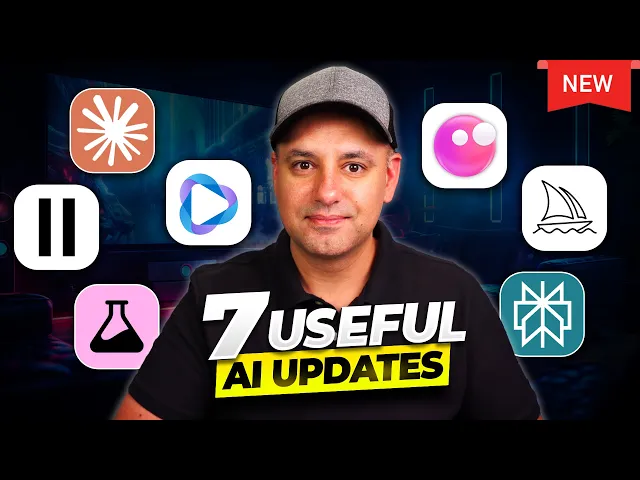7 New AI Updates That Are Ridiculously Useful

AI tools simplify productivity in 2024
In the rapidly evolving landscape of artificial intelligence, keeping up with the most useful innovations can feel like a full-time job. The latest wave of AI tools doesn't just offer incremental improvements – they're fundamentally changing how professionals handle everyday tasks. These practical AI updates are poised to transform productivity for business users who need efficient solutions without deep technical expertise.
Key Points
-
Claude Sonnet, the latest model from Anthropic, offers expanded context windows and significantly enhanced reasoning capabilities that make it particularly valuable for professionals working with complex documents.
-
Perplexity's AI-powered search simplifies research tasks by delivering comprehensive answers with direct citations rather than just links, saving substantial time for professionals who need quick, reliable information.
-
Integration-focused tools like the Zapier AI Actions and Speak's meeting tools are streamlining workflows by connecting existing systems and automating tedious processes without requiring technical expertise.
The Democratization of AI Power
The most profound shift in these recent AI developments isn't just their technical capabilities, but how they're being democratized for everyday business users. Claude Sonnet exemplifies this trend with its 200,000 token context window (roughly 150,000 words) – effectively eliminating the constraints that previously limited AI's usefulness with lengthy documents. This matters tremendously because it transforms AI from a novelty into a practical tool for professionals working with contracts, research papers, or extensive datasets.
What makes this particularly significant is the timing. We're witnessing the intersection of sufficient technical capability with thoughtful user experience design. For the first time, these powerful AI tools don't require prompt engineering expertise or technical background to deliver valuable results. This represents a fundamental shift in who can benefit from AI – moving from developers and engineers to marketing professionals, HR specialists, and other business functions.
The business impact is substantial. McKinsey estimates that AI automation could add $4.4 trillion annually to the global economy, with the most significant gains coming not from replacing workers but from augmenting their capabilities. These new tools are precisely the technologies that will drive that augmentation.
Beyond the Video: Real-World Applications
While the video highlighted several valuable tools, their practical implementation deserves deeper exploration. Consider how legal departments are using Claude's expanded context window to analyze entire
Recent Videos
How To Earn MONEY With Images (No Bullsh*t)
Smart earnings from your image collection In today's digital economy, passive income streams have become increasingly accessible to creators with various skill sets. A recent YouTube video cuts through the hype to explore legitimate ways photographers, designers, and even casual smartphone users can monetize their image collections. The strategies outlined don't rely on unrealistic promises or complicated schemes—instead, they focus on established marketplaces with proven revenue potential for image creators. Key Points Stock photography platforms like Shutterstock, Adobe Stock, and Getty Images remain viable income sources when you understand their specific requirements and optimize your submissions accordingly. Specialized marketplaces focusing...
Oct 3, 2025New SHAPE SHIFTING AI Robot Is Freaking People Out
Liquid robots will change everything In the quiet labs of Carnegie Mellon University, scientists have created something that feels plucked from science fiction—a magnetic slime robot that can transform between liquid and solid states, slipping through tight spaces before reassembling on the other side. This technology, showcased in a recent YouTube video, represents a significant leap beyond traditional robotics into a realm where machines mimic not just animal movements, but their fundamental physical properties. While the internet might be buzzing with dystopian concerns about "shape-shifting terminators," the reality offers far more promising applications that could revolutionize medicine, rescue operations, and...
Oct 3, 2025How To Do Homeless AI Tiktok Trend (Tiktok Homeless AI Tutorial)
AI homeless trend raises ethical concerns In an era where social media trends evolve faster than we can comprehend them, TikTok's "homeless AI" trend has sparked both creative engagement and serious ethical questions. The trend, which involves using AI to transform ordinary photos into images depicting homelessness, has rapidly gained traction across the platform, with creators eagerly jumping on board to showcase their digital transformations. While the technical process is relatively straightforward, the implications of digitally "becoming homeless" for entertainment deserve careful consideration. The video tutorial provides a step-by-step guide on creating these AI-generated images, explaining how users can transform...
